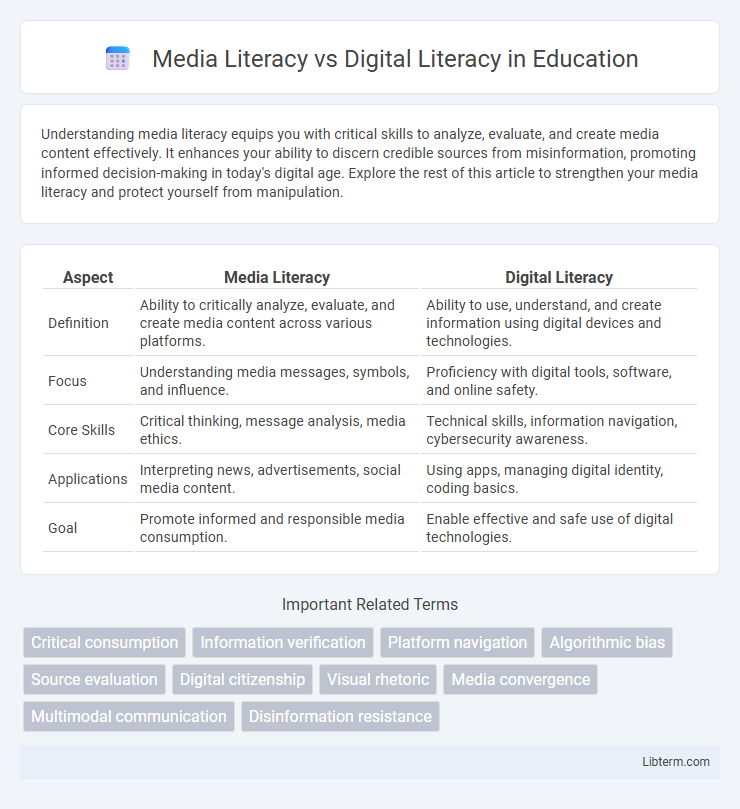Understanding media literacy equips you with critical skills to analyze, evaluate, and create media content effectively. It enhances your ability to discern credible sources from misinformation, promoting informed decision-making in today's digital age. Explore the rest of this article to strengthen your media literacy and protect yourself from manipulation.
Table of Comparison
| Aspect | Media Literacy | Digital Literacy |
|---|---|---|
| Definition | Ability to critically analyze, evaluate, and create media content across various platforms. | Ability to use, understand, and create information using digital devices and technologies. |
| Focus | Understanding media messages, symbols, and influence. | Proficiency with digital tools, software, and online safety. |
| Core Skills | Critical thinking, message analysis, media ethics. | Technical skills, information navigation, cybersecurity awareness. |
| Applications | Interpreting news, advertisements, social media content. | Using apps, managing digital identity, coding basics. |
| Goal | Promote informed and responsible media consumption. | Enable effective and safe use of digital technologies. |
Understanding Media Literacy: Key Concepts
Media literacy encompasses the ability to critically analyze and evaluate various forms of media content, including news, advertisements, and social platforms. It involves understanding media production techniques, bias detection, and the impact of media messages on audiences. Developing skills in media literacy empowers individuals to recognize misinformation, discern credible sources, and engage responsibly with digital and traditional media environments.
Defining Digital Literacy in the Modern World
Digital literacy in the modern world encompasses the ability to effectively find, evaluate, create, and communicate information using digital technologies and platforms. It involves critical thinking skills to discern credible sources, understanding digital tools, and maintaining online security and privacy. Mastery of digital literacy empowers individuals to navigate complex digital environments and participate fully in society's technological landscape.
Core Differences Between Media and Digital Literacy
Media literacy centers on analyzing, evaluating, and creating content across traditional and digital media platforms, emphasizing critical thinking about messages and their influence. Digital literacy involves proficient use of digital tools, technologies, and platforms to communicate, access information, and solve problems effectively in online environments. The core difference lies in media literacy's focus on understanding media content and its impact, whereas digital literacy prioritizes technical skills and navigation within digital systems.
The Overlapping Skills of Media & Digital Literacy
Media literacy and digital literacy share overlapping skills including critical thinking, content evaluation, and the ability to navigate various digital platforms. Both literacies require users to analyze information sources for credibility, detect bias, and understand how media messages influence perception and behavior. Proficiency in these overlapping skills enhances effective communication and informed decision-making in an increasingly digital and media-saturated environment.
The Importance of Media Literacy in Today’s Society
Media literacy empowers individuals to critically analyze and evaluate media content, fostering informed decision-making in an era dominated by pervasive digital information. Understanding media's influence on public opinion and behavior is essential for recognizing bias, misinformation, and propaganda. Developing media literacy skills enhances civic engagement and protects against manipulation in today's complex media landscape.
Digital Literacy: Navigating the Online Landscape
Digital literacy encompasses the skills required to effectively find, evaluate, and create information using digital technologies, emphasizing critical thinking to discern credible sources from misinformation. Navigating the online landscape involves understanding digital tools, managing privacy settings, and recognizing cybersecurity threats to ensure safe and informed interaction across various platforms. Mastery of digital literacy empowers individuals to participate confidently in digital environments, enhancing communication, collaboration, and problem-solving abilities.
Challenges in Promoting Both Literacies
Challenges in promoting media literacy and digital literacy include rapidly evolving technology and the overwhelming volume of information, making it difficult to keep educational content current and relevant. Misunderstandings about the distinct but overlapping skills required for critical analysis of media messages and effective digital tool use hinder effective curriculum development. Limited access to resources and training, particularly in underserved communities, exacerbates disparities in literacy proficiency and digital inclusion.
The Role of Education in Building Literacy Skills
Education plays a critical role in developing media literacy and digital literacy by equipping students with essential skills to critically analyze content and navigate digital environments safely. Integrating curricula that focus on evaluating sources, understanding media bias, and mastering digital tools fosters informed decision-making and responsible online behavior. Schools and educators serve as pivotal agents in preparing individuals to effectively discern misinformation and engage thoughtfully with technology-driven media landscapes.
Practical Strategies for Improving Media and Digital Literacy
Implementing practical strategies to improve media and digital literacy involves critical evaluation of sources, recognizing biases, and verifying information using fact-checking tools like Snopes or FactCheck.org. Developing technical skills such as understanding algorithms, privacy settings, and digital footprints enhances users' ability to navigate digital platforms safely and responsibly. Regular engagement with educational resources like Common Sense Media and digital literacy workshops strengthens analytical skills and promotes responsible content creation and consumption.
Future Trends: Evolving Definitions and Skills
Media literacy and digital literacy are rapidly evolving to incorporate emerging technologies such as artificial intelligence, virtual reality, and blockchain, reshaping how individuals evaluate content credibility and data privacy. Future trends emphasize critical thinking skills and adaptability in navigating deepfakes, algorithm-driven news feeds, and interactive digital environments to foster informed decision-making. The convergence of media and digital literacy will prioritize multi-platform proficiency and ethical use of digital tools, preparing users for a dynamic information landscape.
Media Literacy Infographic

 libterm.com
libterm.com